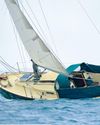Intentar ORO - Gratis
Short-Handed Spinnaker Tips For Cruisers
Yachting Monthly
|June 2017
Lots of us are loath to unleash the coloured beast that lives in a bag in the forepeak, but it’s easily tamed.

Many cruisers look on a spinnaker as some sort of malevolent entity, waiting to pounce on the unwary, wrapping itself around forestays, broaching the boat unpredictably or shredding itself without warning at vast expense. Horror stories are sometimes published describing blood-curdling tales of shooting the wrapped spinnaker to pieces with a Very pistol, yachts with young children aboard hurtling downwind out of control, yachts T-boned when spinnakers on other boats get out of control, and so on.
Honestly, it doesn’t have to be like that. Jill and I invariably sail with no other crew, flying our large, masthead spinnaker on every possible occasion, launching it in true winds of up to about 15 knots and holding on to it for some five or so more than that. The principles for using it are well publicised and not covered in depth here. For short-handed crews, particularly those not as young as they were, I describe a few small requirements and techniques that will make things easier.
The first requirement is that the sail should be contained in a special bag, called a ‘turtle’. This is broad-mouthed, supported around the mouth by battens to enable it to launch and be recovered quickly. It has a base of netting to allow water to drain from it if the kite gets wet. On the outside there are several ties and hooks to help hold it open and attach it to the boat. Ours has Velcro loops on the inside, to which the corners of the sail are attached when the sail is stowed, avoiding embarrassing hoists next time the sail is flown. To this end it also helps to have the head, starboard and port clews identified on the sail.
Esta historia es de la edición June 2017 de Yachting Monthly.
Suscríbete a Magzter GOLD para acceder a miles de historias premium seleccionadas y a más de 9000 revistas y periódicos.
¿Ya eres suscriptor? Iniciar sesión
MÁS HISTORIAS DE Yachting Monthly

Yachting Monthly UK
ALLURES HORIZON 47
Since 2003 Allures have been building yachts that don't sit neatly in one category or another. Rugged explorer yachts with aluminium hulls, the deck and superstructure are fibreglass and as such allow the boat to feel much less utilitarian than some of its all-metal counterparts. This fourth-generation model seeks to take a fresh look at what a blue-water cruising yachts is.
1 mins
January 2026
Yachting Monthly UK
Check your lifejacket light regularly
I have been fortunate to have been able to practise live night time man-overboard drills, both jumping in and running the training exercise.
1 mins
January 2026

Yachting Monthly UK
CORNISH CRABBER 24 MK3
Far from being a lightweight trailer sailer, Nic Compton finds the third version of this modern classic to be a serious little cruising boat capable of handling far more than a little creek crawling
9 mins
January 2026

Yachting Monthly UK
One day you will...
For those dreaming of the joys of owning a yacht, Nick Ridley offers encouragement as well as a look at the harsher reality of financing your dreams
8 mins
January 2026

Yachting Monthly UK
Magenta Project launches its 2025/26 mentoring program
The Magenta Project has launched the 10th edition of its successful mentoring programme.
1 mins
January 2026

Yachting Monthly UK
OVNI 490
Anyone who has followed the last two editions of the Vendée Globe, or even developments in the Class 40 fleet, will know it's now well understood that, if sailors have good protection on watch, they'll perform better as well as be more comfortable. Similar thinking is being applied to cruising yachts, though this can be complicated by a stronger emphasis on aesthetics.
1 min
January 2026

Yachting Monthly UK
J-BOATS J36
This is an evolution of the popular J/112e, with the deck layout, companionway and cockpit updated. It brings the boat into line with the larger J40 and J45 which have been adapted to have a wider appeal to cruisers as powerful, offshore-capable cruiser-racers.
1 mins
January 2026

Yachting Monthly UK
Research your harbours
The more you know about a place before you get there, the better prepared you will be.
1 min
January 2026

Yachting Monthly UK
SAFFIER SE28 LEOPARD
Family-run Dutch yard Saffier has built a reputation as a builder of achingly stylish, extremely fun and very quick daysailer yachts, with the notable recent addition of a 46ft cruiser to the lineup.
2 mins
January 2026

Yachting Monthly UK
Hurricane Tom
Tom's novel could bear the slogan: 'It reads like a survival guide,' both for dealing with highjackers and hurricanes
3 mins
January 2026
Translate
Change font size
